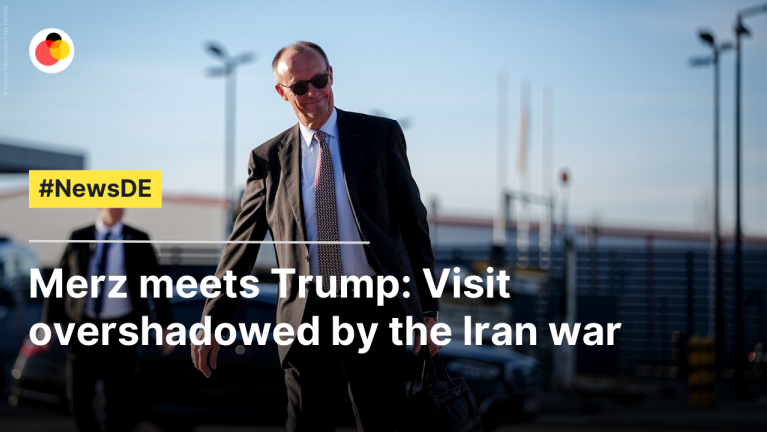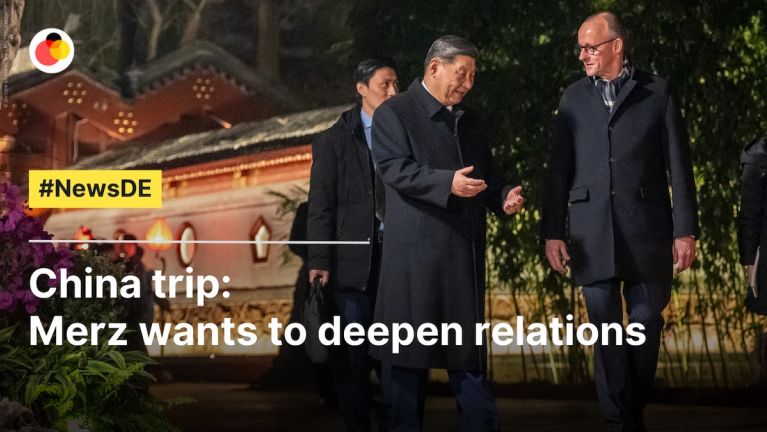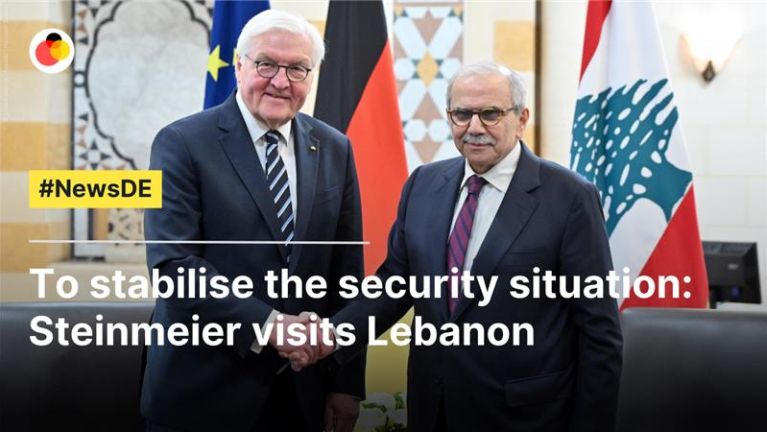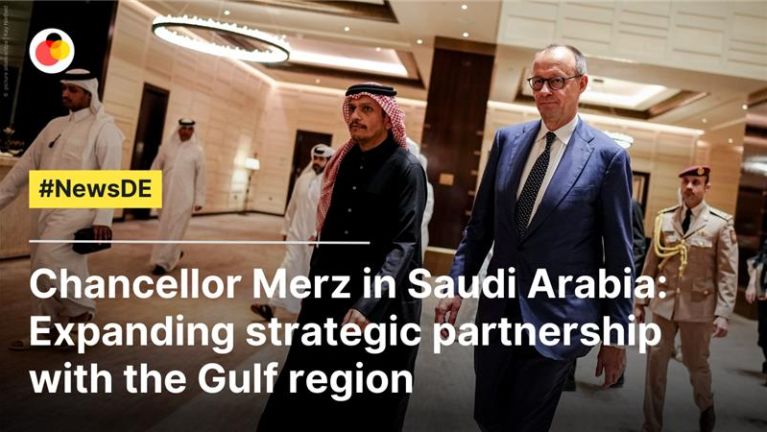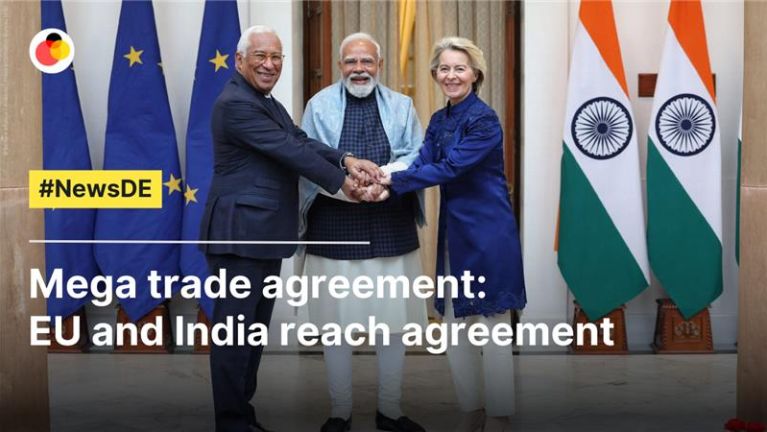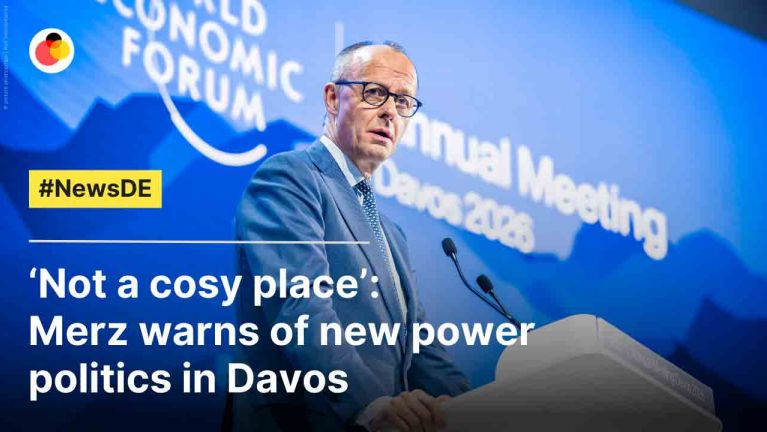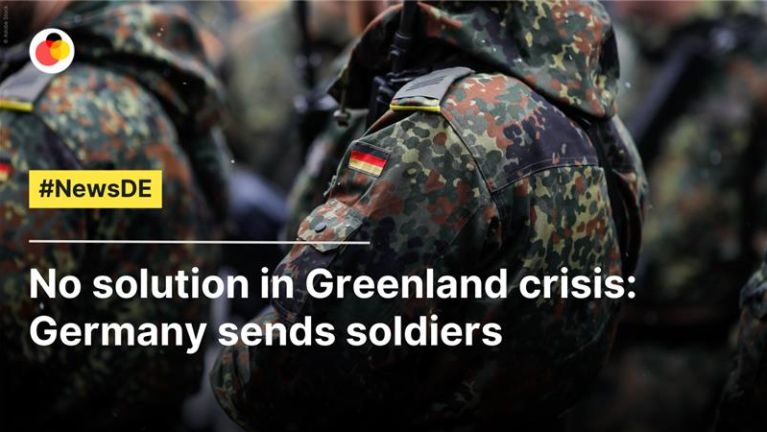Merz meets Trump in Washington
Current information about Germany’s foreign policy and foreign relations.
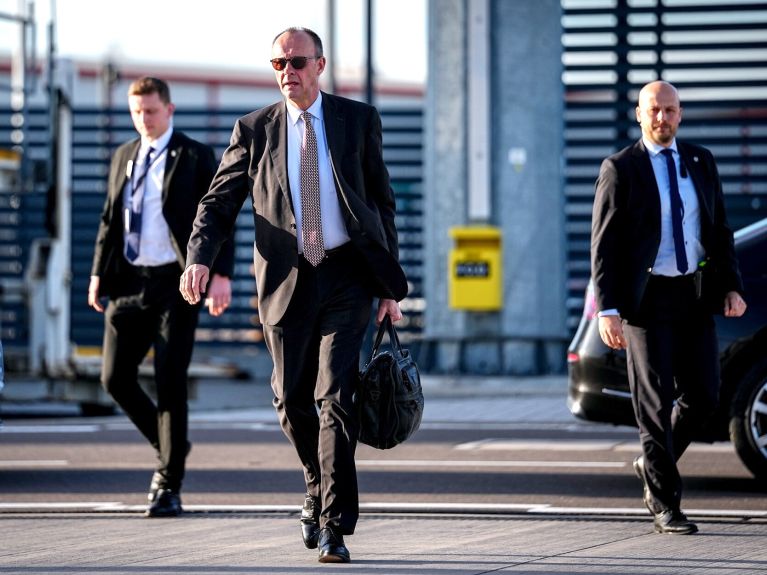
03.03.2026: Merz meets Trump in Washington
Washington (dpa) – Federal Chancellor Friedrich Merz is meeting US President Donald Trump in the White House today (Tuesday). It is his second visit to Washington since taking up office ten months ago. The original plan had been for the two leaders’ talks to focus on the customs dispute between the USA and the EU, as well as the policy on China and the Ukraine war. However, four days after the start of the attacks against Iran by the US and Israel, it is likely that the Middle East conflict will be the main focus.
Merz did not explicitly criticise the military strikes, but at the same time warned of the risks of further escalation. ‘This is not without risk,’ he said on Sunday. It is unclear whether military attacks could bring about political change in Iran.
Further topics that might be discussed during the meeting include transatlantic relations, the customs conflict and further support for Ukraine.
Dieses YouTube-Video kann in einem neuen Tab abgespielt werden
YouTube öffnenThird party content
We use YouTube to embed content that may collect data about your activity. Please review the details and accept the service to see this content.
Open consent form+++
02.03.2026: Merz describes strikes against Iran as “not free of risk”
Berlin (d.de) – Following a meeting of the National Security Council, Federal Chancellor Friedrich Merz confirmed support for the goals pursued by the USA and Israel in the conflict in Iran, however, he also warned against the risks associated with the military strikes. Mr Merz said that the Mullah regime was a “terror regime” and that Germany shared “the relief felt by many Iranians about this Mullah regime coming to an end now”. He continued by saying that international measures aimed at prompting Iran to give up its nuclear and missile programmes had not been successful to date, and pointed out that the strikes were “not free of risk”. The level of “escalation that Iran’s counterattacks could bring to the region” and whether an internal political transformation could be facilitated externally were unclear, Friedrich Merz said.
The Federal Chancellor stated that Germany was facing an international law “dilemma” and that the Federal Government had discussed the situation in great depth. Mr Merz is flying to Washington today to meet US President Donald Trump. The Federal Chancellor announced that he would be discussing the war as part of his upcoming visit with the US President.
+++
27.02.2026: Germany and India step up cooperation on climate action
New Delhi (d.de) – Jochen Flasbarth, Germany’s state secretary for the environment, is attending the World Sustainable Development Summit (WSDS) in New Delhi to intensify cooperation between Germany and India on environmental protection and climate action.
“India is a powerful voice for the Global South and an important partner and bridge-builder for Germany. Above and beyond any geopolitical tensions, we want to bring multilateral negotiations on the protection of our climate and our nature to a successful conclusion,” Flasbarth said.
India is one of the most important partners in the bilateral cooperation pursued by Germany’s federal environment ministry. The Indo-German Green and Sustainable Development Partnership, which has been in place since 2022, provides a platform for working together to achieve the Paris climate targets and the Sustainable Development Goals.
+++
26.02.2026: Merz in China: deepening the partnership
Beijing (dpa/d.de) - During his inaugural visit to China, Germany’s Federal Chancellor Friedrich Merz has appealed for more exchange between the two countries. Merz called for further Chinese investment in Germany to create jobs and for Germany’s “comprehensive strategic partnership” with China to be deepened. On the sidelines of his visit, the sale of 120 Airbus aircraft to China was agreed.
Furthermore, five government agreements were signed in the presence of Li and Merz, including on climate action, on German meat exports that had been suspended due to African swine fever and on the broadcast of German table tennis and football matches on Chinese state media.
The federal chancellor also visited the Forbidden City in Beijing. He wrote in the visitors’ book that he wished Germany and China speed, strength and energy for “a year of cooperation and growth”. The Year of the Horse has just begun in China.
Dieses YouTube-Video kann in einem neuen Tab abgespielt werden
YouTube öffnenThird party content
We use YouTube to embed content that may collect data about your activity. Please review the details and accept the service to see this content.
Open consent form+++
25.02.2026: Merz in China: “great potential for further growth”
Beijing (dpa/d.de) – Federal Chancellor Friedrich Merz has arrived in Beijing. He was received with military honours by Prime Minister Li Qiang and will be meeting President Xi Jinping for talks later today. Mr Merz would like to strengthen economic and diplomatic relations with China. “It is very important to me to maintain and also deepen these, wherever possible,” he said at the start of his visit to China.
The Federal Chancellor also stressed the importance of close cooperation with China at the European level. “We are bearing joint responsibility in this world, and we should fulfil this role together.”
Friedrich Merz stated that there was “great potential for further growth of both national economies” and that “open communication channels” were needed to realise this potential.
Following the meeting, five intergovernmental agreements were signed in the presence of Li and Merz. Among other things, the two sides agreed to continue their cooperation in the fight against climate change.
+++
24.02.2026: Merz travels to China - German business calls for fair competition
Berlin/Cologne (dpa) – Germany’s Federal Chancellor Friedrich Merz is travelling to China for the first time since taking office. He will meet with President Xi Jinping in Beijing to discuss economic cooperation in particular and address security policy issues such as the war in Ukraine.
The Federation of German Industries (BDI) has called on Merz to urge the leadership in Beijing in no uncertain terms to create fair conditions for competition.
The German Economic Institute (IW) also sees German industry as being under pressure from two sides when it comes to trade with China. “On the export side, value adding linked to China is being lost,” states an analysis released by the IW. “And on the import side, there is growing competitive pressure from Chinese products, which is affecting not only export companies but industry across the board.” The analysis says that the automotive industry is particularly hard hit, though mechanical engineering - now the most important sector it terms of exports to China - is suffering too.
Dieses YouTube-Video kann in einem neuen Tab abgespielt werden
YouTube öffnenThird party content
We use YouTube to embed content that may collect data about your activity. Please review the details and accept the service to see this content.
Open consent form+++
23.02.2026: German electrical industry breaks export record
Frankfurt/Main (dpa) - Record exports despite losses due to higher US tariffs: Germany’s electrical and digital industry exported goods worth 257.5 billion euros last year - 5.1 percent up on the 2024 figure.
According to the German Electro and Digital Industry Association (ZVEI), exports to the USA declined by 3.0 percent to 24.1 billion euros in the space of one year. Nonetheless, the United States overtook China as the largest consumer of German-made electronics for the first time in a decade. Goods worth 23.5 billion euros were exported to China last year, which is 6.2 percent down on 2024.
All the other top ten buyers of German electrical and digital goods are European countries. Exports to these countries were up across the board.
+++
20.02.2026: Kiel Institute: US tariffs hit domestic economy hardest
Kiel (dpa) – The punitive tariffs imposed by US President Trump have mostly been impacting the USA’s own economy, according to a study conducted by the Kiel Institute for the World Economy (IfW). It was found in the study that around 96 percent of costs are borne by US importers and consumers, while foreign trade partners are barely affected. Julian Hinz, Research Director at the Kiel Institute, referred to the tariffs as an “own goal” of US trade policy, contradicting the idea that they had been hitting other countries the hardest.
There has been hardly any decrease in the US trade deficit, despite the measure. The US Department of Commerce reported that the balance of trade had been around 901.5 billion dollars in 2025, which is just slightly lower than the previous year’s figure. Economists believe this to be a sign of the punitive tariffs so far not having met their central goal to significantly reduce the trade deficit.
+++
19.02.2026: NATO forces practise amphibious landing on Baltic coast
Putlos (dpa) – NATO has begun to practise amphibious landing on the Baltic coast of Schleswig-Holstein. In this type of military activity, troops are brought to the shore from the sea for fighting or to secure an area. As part of the large-scale Steadfast Dart 26 exercise that started in the morning, the alliance partners have been bringing soldiers, vehicles and materials to shore via the Putlos training ground.
Germany is hosting the exercise and is making the coastal section of the Putlos military training area available for practising the landing operation. Defence Minister Boris Pistorius is among those who are watching the exercise.
Fifteen vessels and around 2,600 soldiers are taking part in the landing, according to information issued by NATO. Some 10,000 soldiers, over 1,500 vehicles and 17 vessels from 13 nations are involved in the overall exercise. The aim of the exercise is to demonstrate how troops can be quickly moved from Southern Europe to NATO’s eastern flank. The activity is taking place without direct involvement of the USA.
+++
18.02.2026: Wildberger: AI partnership with India
New Delhi (d.de) – At the international AI Impact Summit in New Delhi, the German Minister for Digital Transformation Karsten Wildberger has been advocating for a closer partnership with India in the field of artificial intelligence. The Table.Briefings portal reports that the minister has been in India since Tuesday to promote an “alternative approach” to dealing with the domineering role that the USA and China are playing with regard to key technologies. Leading representatives from politics and the tech industry are coming together at the summit to discuss matters of application and regulation as well as economic and societal impacts of artificial intelligence.
Participants include the OpenAI boss Sam Altman, Alphabet boss Sundar Pichai, as well as a number of heads of state and government, such as the French President Emmanuel Macron and President Luiz Inácio Lula da Silva of Brazil. Mr Wildberger is visiting India with a business delegation that includes representatives of SAP, Mercedes-Benz, DeepL and the German AI association Bundesverband KI. Bilateral talks will be held to explore opportunities for more in depth collaboration concerning digital technologies.
+++
17.02.2026: Steinmeier pledges Lebanon further assistance
Berlin (dpa) - German President Frank-Walter Steinmeier has pledged Lebanon further German support to stabilise the country. During a press conference with President Joseph Aoun in Beirut, Steinmeier said that Germany continues to stand by Lebanon’s side.
At the same time, he called on Lebanon and Israel to fulfil their obligations under the 2024 ceasefire agreement. Lebanon must ensure that the disarmament of Hezbollah continues, thereby creating the conditions for an Israeli withdrawal, he said.
Shortly before Steinmeier’s arrival, Israel had attacked targets in the south of Lebanon. Since the ceasefire was agreed in late 2024, both sides have accused the other of violating it. Among other things, the agreement provides for the gradual disarmament of Hezbollah, which the militant group has rejected so far.
In the evening, Steinmeier visited the German frigate “Sachsen-Anhalt” in the port of Beirut. The vessel is taking part in the UN’s UNIFIL mission, helping to secure sea borders and prevent weapons smuggling.
+++
Dieses YouTube-Video kann in einem neuen Tab abgespielt werden
YouTube öffnenThird party content
We use YouTube to embed content that may collect data about your activity. Please review the details and accept the service to see this content.
Open consent form16.02.2026: German President Steinmeier visits Lebanon
Beirut (d.de) – Germany’s President Frank-Walter Steinmeier has arrived in Lebanon with his wife Elke Büdenbender. President Joseph Aoun will be receiving Steinmeier today at the presidential palace in Beirut.
During the course of the day, Steinmeier will then meet with Parliamentary Speaker Nabih Berri and Prime Minister Nawaf Salam. This evening he will be visiting the German frigate Sachsen-Anhalt and talking to soldiers.
Steinmeier will continue his visit to Beirut on Tuesday. His programme includes visits to a monument commemorating the explosion in Beirut port and to a Naval academy. He and his wife will then travel on to Jordan.
+++
14.02.2026: Russia declares DAAD an “undesirable organisation”
(d.de) – Russia has declared the German Academic Exchange Service (DAAD) an “undesirable organisation”, effectively banning it from operating in the country. The Russian Ministry of Justice made the designation on 10 February, the DAAD said on Friday. As a result, the DAAD office in Moscow will now be forced to close, as will the German Centre for Research and Innovation in Moscow, which is run by the DAAD. Foreign Minister Johann Wadephul condemned the move “in the strongest terms” and called on Russia to reverse the decision immediately. He described it as a blow to academic freedom and warned that contacts with the outside world were increasingly being criminalised.
+++
13.02.2026: Germany to purchase combat drones with NATO partners
Brussels (dpa) - Together with European NATO partners, Germany plans to purchase large numbers of inexpensive combat drones. A declaration of intent to this end was signed on the sidelines of a NATO defence ministers’ meeting in Brussels. According to NATO sources, the drones will have a range of at least 500 kilometres.
In a defence scenario, they would be used among other things to overwhelm enemy defence systems. More expensive precision weapons could then be used to more reliably neutralise relevant military targets.
Speaking in Brussels, German Defence Minister Boris Pistorius explained that it was about strengthening conventional European deterrent and defence capabilities within NATO, saying this was important in view of the current challenges.
Besides Germany, countries such as France, the United Kingdom, Poland and Sweden want to be involved in the purchase.
+++
12.02.2026: Wadephul: Central Asia urged to halt circumvention of sanctions on Russia
Berlin (dpa) – Germany’s Foreign Minister, Johann Wadephul, has called on the governments of Central Asian states to take tougher action against the circumvention of sanctions imposed on Russia. “Attempts to evade sanctions support Russia’s war of aggression and pose a direct threat to the European Union,” Wadephul said at meetings with colleagues from Turkmenistan, Tajikistan, Kyrgyzstan, Uzbekistan and Kazakhstan.
For this reason, added the minister, he had urged the Central Asian foreign ministers “to intensify their efforts to tackle sanction evasion and coordinate closely with the European Union in doing so.” Germany and the European Union were looking to expand economic cooperation with Central Asia for mutual benefit, said Wadephul, adding that the federal government was particularly interested in critical raw materials and rare earths.
Frank-Walter Steinmeier likewise previously received the politicians from the Central Asian states.
+++
11.02.2026: Klöckner in Israel: “I come as a friend”
Jerusalem (dpa) – Shortly before her inaugural visit to Israel, Bundestag President Julia Klöckner underlined the unique quality of bilateral relations between Israel and Germany. “There is something that binds our two countries which we do not share with any other country in the world,” Klöckner said. “I come a friend of Israel,” she added, saying this also allowed her to address critical issues.
Klöckner stressed: “Israel has a right to exist and a right to defend itself.” For Germany, she said, the country was “a very important anchor in the Middle East – as a constitutional state and as a democracy”.
In the evening, Klöckner met Israel’s Knesset Speaker Amir Ohana. Today, the two visited the Holocaust memorial Yad Vashem, which commemorates the murder of around six million Jews by the Nazis.
Klöckner will also be attending a session of the Israeli parliament, and a meeting with opposition leader Jair Lapid is planned.
+++
10.02.2026: Bundestag President Klöckner travelling to Israel
Berlin (dpa) – Bundestag President Julia Klöckner is travelling to Israel today for a three-day inaugural visit. She was invited by her Israeli counterpart Amir Ohana. According to the Bundestag, talks will centre around bilateral relations, the situation in the region, the geopolitical situation and questions of cybersecurity to protect the parliaments. “The massive rise in anti-Semitism in Germany is shameful and not acceptable,” she said ahead of her departure. Among other things, meetings with the German-Israeli friendship group in the Knesset are planned. Klöckner also plans to visit Yad Vashem to commemorate the six million or so Jews murdered by the Nazis.
+++
09.02.2026: “Polarstern” embarks on new Antarctic expedition
Bremerhaven/Punta Arenas (Chile) (dpa) – The German research vessel “Polarstern”, operated by the Alfred Wegener Institute (AWI), set sail from Punta Arenas in Chile at the weekend for an expedition to the Antarctic. Until early April, an international team of researchers will be exploring the northwestern part of the Weddell Sea, announced an AWI spokeswoman. Apparently, the summer sea ice has been declining sharply there in recent years, presumably because of warmer surface water.
The expedition is entitled “Summer Weddell Sea Outflow Study” (SWOS). “The aim of SWOS is to investigate why sea ice in the Antarctic has declined so sharpy in recent years and how this is impacting the ecosystem,” said Christian Haas from the AWI. Modern and conventional measurement systems will be deployed, including helicopters to measure sea ice thickness, as well as various trawls and bottom sampling and observation devices.
+++
Dieses YouTube-Video kann in einem neuen Tab abgespielt werden
YouTube öffnenThird party content
We use YouTube to embed content that may collect data about your activity. Please review the details and accept the service to see this content.
Open consent form06.02.2026: Chancellor Merz: “We don’t place the Gulf states under general suspicion”
Riyadh (dpa) – Germany’s Federal Chancellor Friedrich Merz wants to take ties with Saudi Arabia to “a new level”. His two-and-a-half-hour meeting with Saudi Crown Prince Mohammed bin Salman in Riyadh, which marked the start of his tour of the Gulf region, was described by the German delegation afterwards as “warm and open”. Reportedly, the talks focused particularly on expanding economic relations. Saudi Arabia was the first stop on the chancellor’s three-day tour. He travelled on to Qatar on Wednesday. There too, Merz stressed the strategic importance of the relations between the two countries. “In a time of global economic upheaval, geopolitical uncertainties and technological transformation, Germany and Qatar are consciously focusing on dialogue, diversification and investments in the future.”
+++
05.02.2026: Germany and Australia strengthen strategic Critical Minerals Alliance
During a meeting in Canberra, Germany’s Foreign Minister Johann Wadephul and Australian Foreign Minister Penny Wong emphasised the close bilateral ties between their countries. Ahead of the 75th anniversary of diplomatic relations, which will be celebrated in 2027, the two top diplomats agreed to further increase cooperation between Europe and the Indo-Pacific region and make a joint commitment to security, freedom and prosperity.
First and foremost, the strategic partnership is to be stepped up in defence, cybersecurity and renewable energies. Cooperation on critical minerals such as lithium is also to be expanded. “Many important raw materials, such as lithium, are extracted here and we have great interest in expanding our cooperation in raw materials, particularly when it comes to strategically important minerals,” said Wadephul. Australia is home to the world’s largest hard-rock lithium mine - which is of key importance to Germany’s energy transition and industry.
+++
04.02.2026: Chancellor Merz visits Gulf region
Berlin (dpa) - Germany’s Federal Chancellor Friedrich Merz is setting off today for his first trip to the economically strong and strategically important Gulf region. Saudi Arabia will be his first stop, after which he will travel on to Qatar and the United Arab Emirates. Merz wants to step up Germany’s partnerships with all three countries in a changing world. Cooperation with these oil- and gas-rich countries is to be intensified in the energy sector in particular. The Iran conflict will doubtless be addressed during the talks, too. Ahead of Merz, Economics Minister Katherina Reiche had already travelled to Saudi Arabia.
+++
03.02.2026: Wadephul establishes relations with South Pacific island of Niue
Auckland/Kerikeri (dpa) - With 1,700 inhabitants and covering an area of around 260 square kilometres, the small South Pacific island of Niue is situated some 4,500 kilometres east of the Australian coast, between Fiji and the Cook Islands. And around 2,400 kilometres north-east of New Zealand. On Tuesday, Germany formally established bilateral relations with the island in the Pacific.
During a visit to the New Zealand city of Auckland, German Foreign Minister Johann Wadephul and Niue Prime Minister Dalton Tagelagi jointly signed a declaration to this effect. A ceremony of this kind is also a rare occurrence for the German minister.
“It’s a special experience that I can take part in this ceremony today,” said Wadephul. He said that the recognition of Niue “shows the appreciation that Germany has for this country, the importance we attach to the right of peoples to self-determination and the importance we attach to the Pacific islands”.
+++
02.02.2026: Germany and Singapore seek to deepen their partnership
Singapore (dpa) - In view of US President Donald Trump’s power politics, Germany and Singapore are keen to step up their joint commitment to rules-based international cooperation. “We are currently experiencing geopolitical shifts and uncertainties. International cooperation and multilateral institutions are being called into question,” Foreign Minister Johann Wadephul said in Singapore at a meeting with his counterpart Vivian Balakrishnan. Wadephul raised the topic of a possible free trade agreement between the EU and the ASEAN group of countries.
He said that Germany and Singapore knew only too well that “we owe our freedom, our security and our prosperity to a stable international order with dependable rules”. He added that this applied both to relations between states and to free and fair trade.
The EU signed its first free trade deal with an Asian state - namely Singapore - in 2019. He explained that this could give rise to further agreements that the EU would also like to conclude in the Indo-Pacific region. Wadephul also met with Singapore’s Prime Minister Lawrence Wong.
+++
30.01.2026: Wadephul refers to the Iranian Revolutionary Guard as the “henchmen of the regime”
Brussels (dpa) – The EU has designated Iran’s Revolutionary Guard as a terrorist organisation, due to its action against anti-government protests. The EU’s chief diplomat Kaja Kallas reported that the decision had been made against the background of the events of the past few weeks, ending years of division on the issue.
Germany’s Foreign Minister Johann Wadephul described the step as a political message that had been overdue and referred to the Revolutionary Guard as the “henchmen of the regime”.
“It is they who attack their own population with immeasurable brutality, who have quite literally executed their own people for daring to raise their voices on the streets,” Mr Wadephul said. He added that they were responsible for the destabilising role that Iran played in the region and were behind attempted attacks here in Germany and Europe.
The elite forces have been playing a key role in the brutal suppression of protests. The human rights organisation HRANA reports that more than 6,200 deaths had been confirmed to date, while the EU Foreign Ministers recently stated that there could be up to 30,000 victims.
+++
29.01.2026: German automotive manufacturers defend their top position in Europe
Brussels/Munich (dpa) – 140 years ago in Mannheim, on 29 January 1886, Carl Benz paved the way for modern motor cars with his patent document DRP 37435. On today’s anniversary it is obvious that the industry is doing very well in Europe: German automotive manufacturers were able to defend and even increase their market shares in the past year. The VW, BMW and Mercedes groups accounted for a combined market share of 39.9 percent, according to the figures issued by the European manufacturers’ association Acea. That corresponds to an increase of 1.2 percentage points compared to the year before. VW in particular was able to considerably grow its market share. BMW’s share also rose, while the share accounted for by Mercedes remained stable.
Total car sales in the EU went up 1.8 percent in 2025 to 10.8 million vehicles. While this is the highest number of this decade to date, it is still considerably lower than the pre-Covid figure of 13 million cars sold in 2019, according to an analysis conducted by the consultancy firm EY. In that year, German corporations had a market share of 37.1 percent, 2.8 percentage points less than in 2025.
The market share of fully electric cars rose from 13.6 to 17.4 percent. A significant decrease can meanwhile be observed in the category of purely petrol-powered vehicles, whose market share dropped from 33.3 down to 26.6 percent. This means that hybrid cars, excluding plug-in hybrids, now account for the greatest market share of 34.5 percent. This corresponds to a year-on-year increase of 3.6 percentage points.
+++
28.01.2026: Pistorius: Nato mission in Greenland well on track
Berlin (dpa) – The German Defence Minister Boris Pistorius is confident that a joint Nato mission can be realised in Greenland, possibly with involvement of the USA. At an event held by the German Chamber of Commerce and Industry in Berlin, Mr Pistorius said that the talks were going well at the military level. He added that no decision in favour of the mission had been made to date, as negotiations were ongoing.
Boris Pistorius explained that Nato was well on track towards realising the proposed Arctic Sentry surveillance mission as a joint operation. The goal of the mission is to reinforce the alliance’s presence in the Arctic as a strategically important connection between Europe and North America. Mr Pistorius welcomed the fact that the USA had recently indicated a willingness to refrain from threatening Greenland further and that an understanding had been reached concerning the aim to jointly protect the island.
+++
Dieses YouTube-Video kann in einem neuen Tab abgespielt werden
YouTube öffnenThird party content
We use YouTube to embed content that may collect data about your activity. Please review the details and accept the service to see this content.
Open consent form27.01.2026: EU and India agree on trade deal
New Delhi (dpa) – The EU and India have concluded their negotiations concerning the establishment of a huge new free trade area. This was announced by the President of the EU Commission Ursula von der Leyen and India’s Prime Minister Narendra Modi in New Delhi. During his recent visit to India in mid-January, Federal Chancellor Friedrich Merz had actively promoted the free trade agreement.
The removal of trade barriers and customs duties is intended to stimulate the flow of goods and services between the EU and India. The goal is to promote growth and the creation of jobs, and to reduce dependency on other states at the same time. Against the background of the USA’s aggressive tariff and trade policy and China’s growing thirst for power, the agreement is also considered a step of great geopolitical relevance.
The German automotive industry in particular could benefit from the agreement, according to information issued by the EU, as India has been charging high tariffs of up to 110 percent on cars imported from the EU. Planning now provides for these tariffs to be gradually lowered to 10 percent for at least 250,000 vehicles per year, and for tariffs on car parts to be eliminated entirely within five to ten years. It was further reported that tariffs on machinery (up to 44 percent), chemicals (up to 22 percent) and pharmaceuticals (up to 11 percent) will be largely eliminated, too.
+++
26.01.2026: Wadephul calls on Europeans to show unity
Berlin (dpa) – German Foreign Minister Johann Wadephul has called on Europeans to stand united in light of frictions surrounding US President Donald Trump and ongoing hybrid attacks by Russia in the Baltic Sea region. “In this phase of geopolitical upheaval, we Europeans must present a confident and united front and act accordingly,” Wadephul said ahead of his visit to EU and NATO partners Latvia and Sweden. What matters, he said, is “that we do not allow ourselves to be divided – because that is precisely the aim of those who have an interest in the disintegration of our defence alliance and the European Union”.
Trump somewhat eased tensions over Greenland last week when he said he did not intend to pursue a violent solution after all. He again affronted NATO partners at the weekend, however – this time with disparaging remarks about their deployment in Afghanistan.
Wadephul is to deliver a speech as guest of honour at the Latvian Ambassadors’ Conference in the Latvian capital of Riga. In addition, talks are scheduled with his counterpart Baiba Braže. In the afternoon, Wadephul plans to meet his Swedish counterpart Maria Stenergard in the Swedish capital Stockholm. Sweden did not join NATO until March 2024 after around 200 years of military non-alignment.
+++
23.01.2026: Klingbeil calls for talks on nuclear protection
Berlin (dpa) – Vice Chancellor and Federal Minister of Finance Lars Klingbeil has spoken out in favour of a strategic dialogue with France on nuclear protection for Europe. France had offered to make its nuclear umbrella more available for European security, Klingbeil said. “We should engage in this discussion,” he urged.
According to Klingbeil, NATO’s nuclear deterrence and Germany’s participation in US nuclear sharing are not in question. The transatlantic pillar of security must be preserved, said the minister, adding that
Germany would remain bound by the Nuclear Non-Proliferation Treaty and would not acquire nuclear weapons of its own. Nevertheless it was right to accept France’s offer of talks, said Klingbeil, noting that a strategic dialogue between Germany and France was appropriate given the current security situation.
Germany is not a nuclear power, but in connection with NATO’s nuclear-sharing arrangements it contributes to deterrence and provides combat aircraft for this purpose. US nuclear weapons are stationed in Germany and could be deployed in the event of defence.
+++
Dieses YouTube-Video kann in einem neuen Tab abgespielt werden
YouTube öffnenThird party content
We use YouTube to embed content that may collect data about your activity. Please review the details and accept the service to see this content.
Open consent form22.01.2026: Merz in Davos: power alone is not enough
Davos (dpa) – Federal Chancellor Friedrich Merz has warned on the international stage against relying solely on strength and power in geopolitical cooperation. “A world in which only power counts is a dangerous place,” he said at the World Economic Forum in Davos, adding that this applied “first to small states, then to middle powers, and ultimately to the great powers.” The greatest strength, Merz said, arose from the ability to build partnerships and alliances based on mutual trust and respect.
Recent tensions over Greenland involving US President Donald Trump have fuelled concerns about the future of NATO. Trump has repeatedly laid claim to the island, which belongs to NATO ally Denmark.
By contrast, Merz stressed: “We Europeans, we Germans know how precious the trust is on which NATO is built. In an age of great powers, the United States will also depend on this trust. It is their decisive competitive advantage – and ours. Autocracies may have subjects. Democracies have partners and reliable friends.”
+++
21.01.2026: Wadephul: expanding partnerships in Africa
Berlin (dpa) – Foreign Minister Johann Wadephul wants to expand partnerships with key countries in Africa. “In times of trade restrictions and protectionist tendencies it is essential for us as an export nation to take a broader approach and to create even more closely-knit networks,” Mr Wadephul said before departing on a two-day trip to Africa on which he will be visiting Kenya and Ethiopia.
The Foreign Minister stated that Germany had a great deal to offer for African countries. “Our country stands for international cooperation, economic openness and political reliability.”
Johann Wadephul said that Africa was increasingly becoming a centre of gravity in our multipolar world, and that this was why the Federal Government would like to strengthen its cooperation with the African Union (AU). Among other things, Mr Wadephul will be meeting President William Ruto and the Prime Cabinet Secretary and Cabinet Secretary for Foreign and Diaspora Affairs Musalia Mudavadi for talks in Kenya’s capital city Nairobi today.
+++
20.01.2026: Joining forces to strengthen start-up companies
Berlin (dpa) – Germany and France want to encourage young, rapidly growing companies to stay in Europe and to prevent them from moving to the USA. It was essential to create better conditions for start-up companies, Federal Finance Minister Lars Klingbeil said at an event in Berlin that was also attended by the French Minister of Finance Roland Lescure. Mr Klingbeil pointed out that young companies needed to have access to sufficient capital and had to be enabled to grow in the EU. An expert report has been drawn up that includes recommendations for specific measures as well as a proposal for a uniform EU-wide legal form for companies.
+++
19.01.2026: Wadephul on Greenland: “tariffs are the wrong type of response”
Berlin/Brussels/Washington (dpa) – Germany and the other affected European states do not want to accept the new tariffs announced by US President Donald Trump over the Greenland conflict. “Tariff threats undermine transatlantic relations and risk a dangerous downward spiral,” a joint statement issued by Germany, Denmark, Finland, France, the Netherlands, Norway, Sweden and the United Kingdom reads. The states would ensure that their sovereignty is upheld, the statement continues. Germany’s Foreign Minister Johann Wadephul expects that the tariff agreement whose terms are highly favourable for the USA will not be ratified by the European Parliament for the time being. Speaking to the broadcaster ARD, Johann Wadephul also said that he would not rule out counter tariffs. If the USA took further steps, there would “have to be a European response,” he pointed out, adding that there would be in-depth discussions with Washington. Mr Wadephul explained that tariffs were generally “the wrong type of response among allies” and “poison for transatlantic relations”.
+++
16.01.2026: NATO begins major exercise in Germany
Emden (dpa, d.de) – NATO has begun deploying thousands of servicemen and women, along with equipment and military vehicles from across Europe to Germany for the major exercise “Steadfast Dart 26”. Germany will act as host nation for the deployment over the coming weeks and also as the central hub for transfers. In addition to sea transport, further elements of NATO’s “Allied Reaction Force”, a rapid intervention force, are due to arrive in Germany by road convoys and air transport.
“Steadfast Dart 26” is NATO’s largest exercise this year. The alliance is training to move servicemen and women, along with equipment and vehicles, as swiftly and in a coordinated manner as possible within NATO territory. In doing so, it aims to demonstrate its ability to defend against attacks on alliance territory. The exercise involves around 10,000 servicemen and women from eleven NATO member countries: Italy, Greece, Germany, Czech Republic, Spain, Lithuania, Bulgaria, Turkey, France, Belgium and the United Kingdom. It includes forces from the army, air force and navy, as well as space and cyber units.
According to NATO, the major exercise will take place across several sites in Central Europe, but the most important elements are scheduled to occur in Germany. As host nation, Germany will provide food, accommodation, fuel, medical services, technical support, legal advice and security for the allied troops.
+++
Dieses YouTube-Video kann in einem neuen Tab abgespielt werden
YouTube öffnenThird party content
We use YouTube to embed content that may collect data about your activity. Please review the details and accept the service to see this content.
Open consent form+++
